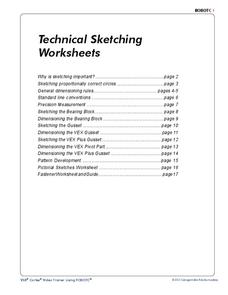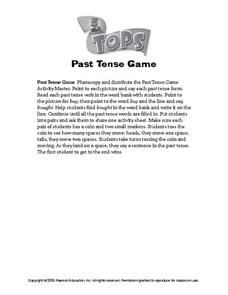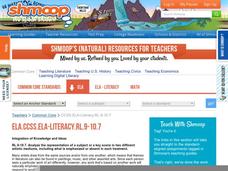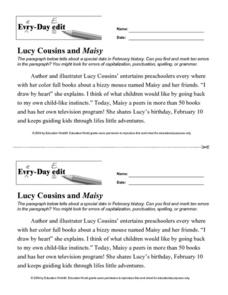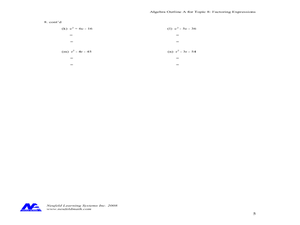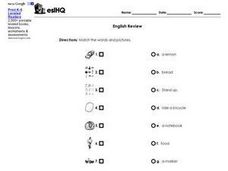Chemical Education Foundation
Teacher's Guide to Science Projects
Do you find the idea of having a science fair with all of your students intimidating? Use a guide that provides everything you need to know to make project-based learning manageable. The resource includes options for four...
K12 Reader
Converting Fractions to Decimals
After examining a short article on fractions and decimals, readers draw information for the text to respond to a series of reading comprehension questions.
Curated OER
View Tubes: Student Worksheet
Here is a worksheet that is almost a lesson! In it, learners conduct an experiment in which they determine the size of objects when viewed through viewing tubes. This resource has all of the instructions and tables necessary to complete...
Curated OER
Dragon Genetics ~ Independent Assortment and Genetic Linkage
Imagine a pair of dragons that produce offspring. What percentage of the hatchlings have wings and large antlers? An engaging activity draws genetics learners in, introduces them to alleles, meiosis, phenotypes, genotypes, and...
Math Centre UK
Integrating Algebraic Fractions 1
Don't get stuck on the integral when you can incorporate partial fractions. A well-explained guide, there are seven pages and a tutorial video that detail the steps for different types of algebraic fractions.
Carnegie Mellon University
Technical Sketching Worksheets
How do you create a technical drawing? Cover the basics of technical sketching with a few practice sketches of simple shapes. A technical sketching lesson introduces the proper precision measurement techniques. Pupils progress...
Peter Bunzl
Cogheart and Moonlocket
Peter Bunzi takes readers to the Victorian era with two stories, Coghaert and Moonlocket. Accompany the literary time warp with a companion packet that offers a plethora of exercises. Learning...
Pearson
Past Tense Game
Teach and taught, learn and learned! Work with your class on the past tense with some guided practice and a game. As a class, match the present tense verbs with their past tense counterparts. Learners then split off into pairs to play...
EngageNY
Finding Systems of Inequalities That Describe Triangular and Rectangular Regions
How do you build a polygon from an inequality? An engaging lesson challenges pupils to do just that. Building from the previous lesson in this series, learners write systems of inequalities to model rectangles, triangles, and even...
Shmoop
ELA.CCSS.ELA-Literacy.RL.9-10.7
Use this resource's pairings of classical literature and paintings to practice the skill of comparing different artistic mediums with your ELA class. Addressing standard 7 for literature in the Common Core, the resource encourages your...
Education World
Every Day Edit - Lucy Cousins and Maisy
In this everyday editing learning exercise, students correct grammatical mistakes in a short paragraph about Lucy Cousins. The errors range from punctuation, capitalization, spelling, and grammar.
K12 Reader
Traveling to the Distant West
If you build it they can come. After reading a short article about the impact of western expansion, middle schoolers cite evidence from the article to explain how this expansion forced changes in transportation.
Curated OER
Cartoons in the Classroom: Doves, Flags, and Bombs
A political cartoon is timely and thought-provoking. Learners analyze the symbolism found in the cartoon as it relates to current tensions between North and South Korea. Three in-depth analysis questions guide and stimulate class...
K12 Reader
Broken Promises
This comprehension worksheet asks readers to respond to a series of questions based on an article about the treatment of native peoples.
K12 Reader
Atmospheric Layers
In this two-part reading comprehension worksheet, kids read a passage about the atmospheric layers surrounding the earth and then respond to a series of comprehension questions based on the passage.
K12 Reader
Extreme Weather
Thunderstorms, tornados, blizzards, hurricanes. These extreme forms of weather are the focus of an article on a two-part reading comprehension worksheet. After reading the passage, kids use information in the text to respond to a series...
Curated OER
Naming Polygons
What polygon is this? Young geometers categorize shapes by circling all the quadrilaterals in a set of figures. Next, they write the names of 10 polygons using a visual guide as reference. Review the guide together before they start if...
Curated OER
Triangles
Why are there so many different types of triangles? Be that as it may, beginning geometers need to understand the differences between equilateral, isosceles, scalene, and right triangles, and they get a visual approach with this...
Curated OER
Transformations
Several practice exercises suitable for any geometry class working on transformation, symmetry, and tessellation -- especially visual representations of image translation, rotation, and reflection, symmetry, tessellations and tangrams --...
Curated OER
ESL: Body Parts Matching
Match drawings of basic body parts with their names. A handy tool for teachers of beginning ELLs.
Curated OER
Factoring Expressions
In this factoring worksheet, high schoolers factor guided monomials, then binomials, and work their way to trinomials. There are 8 questions with multiple parts.
Curated OER
ESL: Basic Vocabulary Matching
Newcomers to English can practice vocabulary about food, daily actions, and school supplies with this 10-question matching exercise. Simple line drawings represent basic terms for beginners.
EngageNY
The Distance from a Point to a Line
What is the fastest way to get from point A to line l? A straight perpendicular line! Learners use what they have learned in the previous lessons in this series and develop a formula for finding the shortest distance from...
EngageNY
The Relationship of Multiplication and Division
Take any number, multiply it by five, and then divide by five. Did you end up with the original number? In the same vein as the previous lesson, pupils discover the relationship between multiplication and division. They develop the...





